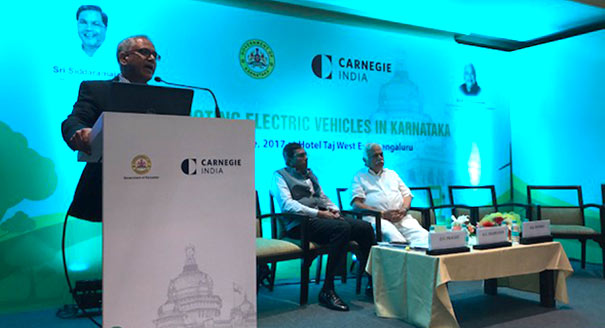Registration
You will receive an email confirming your registration.
Electric vehicles (EVs) are being touted as the personal and public transportation solution of the future, a fact underlined by the surging popularity of companies like Tesla. In India, mass adoption of EVs could potentially render a number of benefits, including reduced air pollution, increased employment, and greater industrialization. Within India, the state of Karnataka has a distinctive advantage in this regard due to its high-tech manufacturing clusters and technology-driven R&D ecosystem, along with a population that is highly aware and has a high per capita income. Carnegie India, in collaboration with the government of Karnataka, brought together policymakers, industry leaders, researchers, and early adopters for a closed-door roundtable discussion in Bengaluru to prepare recommendations for a comprehensive EV policy.
Discussion Highlights
- Challenges: Participants outlined two key challenges that the EV industry faces:
- The lack of significant consumer demand. This has impeded profit-generation in the near term, discouraging potential players in the sector. Participants highlighted that most EVs are either more expensive than conventional vehicles or cannot match their capabilities, further impacting its demand potential.
- The overall lack of user-friendly charging infrastructure in India. This has made the use of EVs considerably difficult for consumers.
- Opportunities: The participants asserted that there are considerable opportunities in the EV sector, especially in Karnataka. The high per capita income in the state, along with the willingness of the people in a city like Bengaluru to experiment, creates a huge market potential for EVs in Karnataka, they said. Participants suggested that this market potential could be harnessed by coordinating the state’s various existing industry-friendly policies to develop a coherent EV policy framework, which in turn would boost investments in this sector. Participants also pointed out that all the ingredients necessary to develop a robust EV ecosystem exist in Karnataka, and the only requirement would be to connect the dots among the various policies and industries in the state. This would allow the state of Karnataka to gain an early lead over other regions in India, and maintain its status as the technology hub of the country.
- Incentives: Participants argued that an initial government incentives program would be required to make EV manufacturing and mass adoption economically viable. These incentives could be on both the demand-side and supply-side of EVs. To encourage adoption, participants argued that the government of Karnataka could provide direct subsidies and tax rebates to the purchasers and mandate government procurement of EVs. On the supply- side, the incentive structure should be multi-faceted and simultaneously aim at manufacturing, product quality, base technologies, and financial viability, participants said.
- Building Public Infrastructure in Karnataka: All participants agreed that mass adoption of EVs would depend on the availability of adequate and accessible public infrastructure such as charging points and battery stations. This infrastructure, however, would require considerable investment and serious feasibility studies, especially of the current electricity grid and its capacities. Some participants also argued that deployment of swappable battery technologies is critical to EV infrastructure, as this would reduce the overall cost of batteries, which currently forms the bulk of an EV's cost structure. While participants agreed that national standards are important to build the necessary infrastructure, the exact form of these standards was a contentious issue. In the short term, participants suggested, government bodies and transport authorities such as the Bengaluru Metropolitan Transport Corporation should map out routes with adequate existing infrastructure, and roll out public electric transport, such as buses, on these routes.
- Research, Development and Innovation: A number of participants stated that until indigenous research and development in the EV and allied space is given a boost, India will become dependent on foreign automobile and component manufacturers to meet its EV demand. In this regard, the participants identified three important steps for the government of Karnataka to push local research and development in the sector:
- Establish EV and EV components incubation centers in select engineering colleges within the state of Karnataka.
- Create a mandate to facilitate industry-academia linkages through a public portal that tracks EV research advances in academia for the benefit of industry stakeholders.
- Provide grants for specific areas of research such as battery manufacturing to sector-specific startups and research institutions, within the broad framework of national research programs.
This event report was prepared by Ananth Padmanabhan, fellow at Carnegie India, R. Shashank Reddy, a researcher at Carnegie India, and Raushan Tara Jaswal, an intern at Carnegie India.
